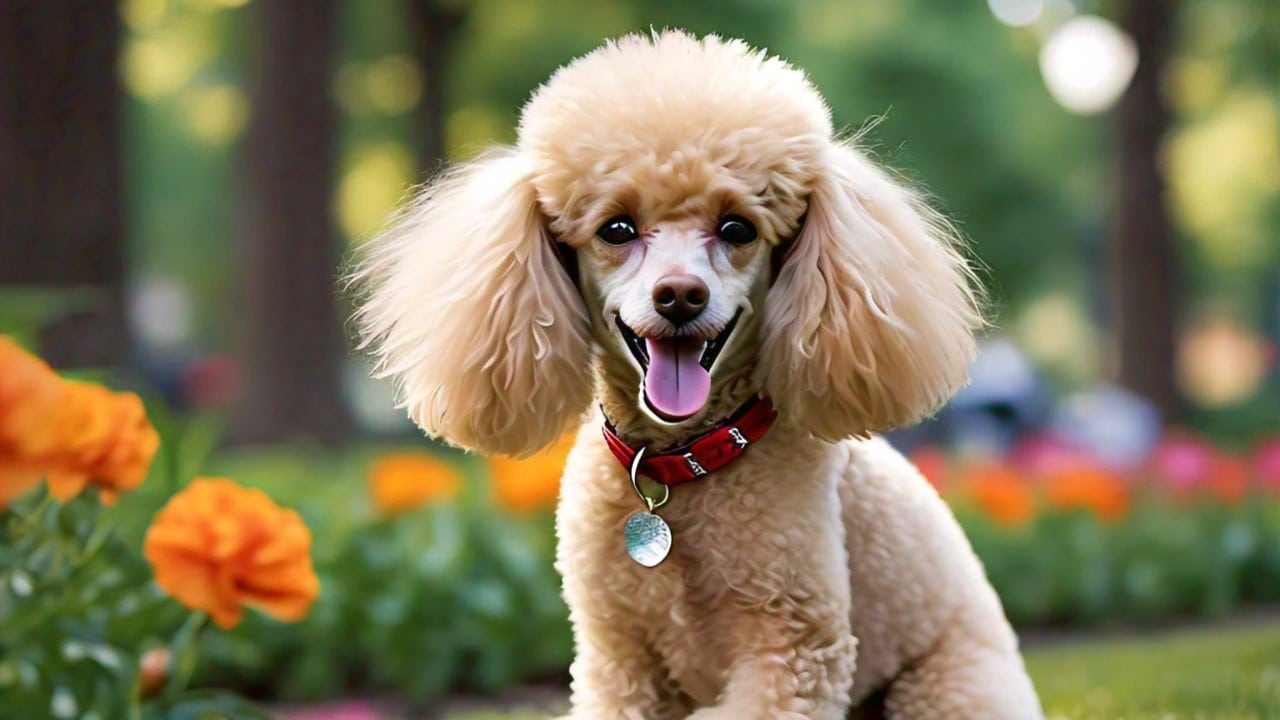Miniature Poodles, though small in size, are powerful in personality and presence. Their intelligence, affectionate nature, and versatility make them ideal companions for those who seek a lively, intelligent pet with a history of both companionship and working prowess.
Miniature Poodles appeal to a wide range of people, from families to singles, and their hypoallergenic coat adds further appeal to this already beloved breed.
Table of Contents
ToggleThe Origins and History of Miniature Poodles
Though associated with France, Poodles trace their roots to Germany, where they originally worked as water retrievers. Known for their intelligence and trainability, Poodles assisted hunters by retrieving waterfowl from lakes and rivers.
Over time, selective breeding refined the Poodle’s size, giving rise to Miniature Poodles—a size that retained the Standard Poodle’s athleticism while adding a more adaptable, companionable aspect.
Miniature Poodles soon became very popular across Europe and they are prized for both their hunting skills and companionship.
Physical Characteristics and Appearance
Miniature Poodles are small yet robust, typically standing between 10-15 inches tall and weighing 10-15 pounds. They exhibit a refined physique that retains the athletic proportions of the Standard Poodle.
Their iconic curly coat is not only visually distinctive but also hypoallergenic, appealing to individuals with allergies. Coat colours are as varied as their personalities, spanning white, black, apricot, and more exotic shades like blue or silver.
Temperament and Personality
Renowned for their affectionate, lively nature, Miniature Poodles make ideal family pets. They possess a unique sensitivity to human emotions, often displaying a deep empathy towards their owners.
This trait makes them particularly suitable as therapy dogs, where their emotional intelligence truly shines. While they enjoy social interaction, Miniature Poodles can sometimes show an independent streak.
Regular engagement is essential, as it helps them remain well-adjusted, ensuring they neither become overly dependent nor distant.
The Intelligence of Miniature Poodles
Few breeds match the intelligence of the Miniature Poodle. Their quick learning ability means they excel in training, and grasping commands and tricks faster than most breeds.
Mental stimulation is a must to keep these dogs from becoming bored or anxious. Without it, they may engage in mischievous or even destructive behaviour.
Incorporating a variety of mentally engaging activities, like puzzle toys, scent games, or obedience training, helps keep them focused and happy. With a Miniature Poodle, you’ll find both a clever companion and a willing student.
Exercise Needs and Physical Activity
Despite their compact size, Miniature Poodles are highly energetic and thrive on regular physical activity. They need a mix of daily walks, playtime, and interactive exercises like fetch or agility games.
Miniature Poodles are surprisingly athletic and capable of tackling agility courses with enthusiasm. For those who enjoy an active lifestyle, these dogs are ideal, as they love activities that allow them to run, jump, and play.
Sufficient exercise not only maintains their physical health but also curbs restlessness, keeping them well-balanced and content.
Grooming and Coat Care
The grooming needs of Miniature Poodles are substantial but rewarding. Their hypoallergenic, curly coats grow continuously, requiring trimming every six to eight weeks.
Regular brushing is essential to prevent matting and tangles, especially in sensitive areas like the ears and legs. Grooming extends beyond brushing, as these dogs need their ears cleaned, nails trimmed, and teeth brushed regularly.
Adopting a consistent grooming routine not only keeps them looking sharp but also ensures they remain comfortable, as neglected coats can quickly lead to skin irritation or other issues.
Common Health Issues in Miniature Poodles
While generally healthy, Miniature Poodles are prone to certain genetic health conditions, including hip dysplasia, progressive retinal atrophy, and Addison’s disease.
Addison’s disease, an endocrine disorder, affects their hormone production and requires long-term management. Eye issues are also common, with regular check-ups recommended to catch any early signs of retinal degeneration.
Responsible breeders typically conduct genetic testing to reduce the risk of passing on such conditions. Regular vet check-ups, balanced nutrition, and consistent exercise all contribute to their long-term health, allowing them to lead a vibrant, active life.
Training Tips for Miniature Poodles
Training a Miniature Poodle is a fulfilling experience, as their eagerness to please makes them highly receptive to commands.
Start with basic obedience training, introducing commands like sit, stay, and come. Positive reinforcement works wonders, as these dogs respond particularly well to praise, treats, and affection.
Given their agility and intelligence, Miniature Poodles often excel in agility courses, advanced obedience classes, and even therapy dog training.
Consistency is key; with steady guidance, a Miniature Poodle can master a range of commands and activities, making them a delightfully obedient and capable companion.
Socialization and Interaction
Proper socialization is crucial for Miniature Poodles, as it helps them develop confidence and reduces the risk of behavioural issues like shyness or excessive barking.
Expose them to different environments, people, and animals from an early age to foster a well-rounded temperament.
Walks in diverse settings, visits to pet-friendly parks, and playdates with other dogs contribute to a Miniature Poodle’s adaptability.
Socialization ensures they feel comfortable in a variety of situations, enhancing their role as versatile, well-adjusted companions.
Ideal Living Conditions
Miniature Poodles are highly adaptable to different living environments, thriving in both apartments and houses with yards. Due to their compact size, they do not require vast spaces, but they do need an environment rich in stimulation.
Owners who spend ample time interacting with their Poodles, offering them toys, and engaging in activities will find their dogs remain happy and balanced, regardless of the size of their living space. This adaptability, combined with a low-shedding coat, makes them ideal for urban settings.
Conclusion
Miniature Poodles are a remarkable breed, seamlessly blending elegance, intelligence, and affection in a compact form. With the right care, regular grooming, and consistent training, these dogs make loyal, delightful companions.
Their adaptability to both city and rural living, paired with their hypoallergenic coat, broadens their appeal, making them suitable for a wide range of families and lifestyles.






